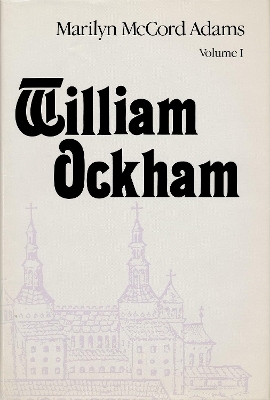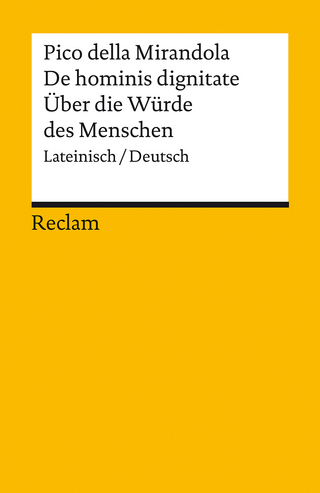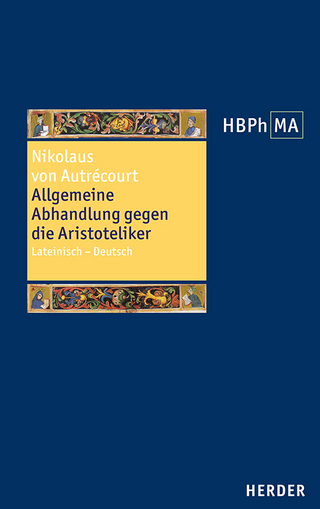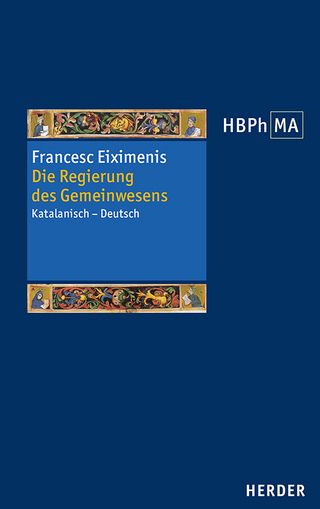
William Ockham
Two Volume Set
Seiten
1989
University of Notre Dame Press (Verlag)
978-0-268-01945-7 (ISBN)
University of Notre Dame Press (Verlag)
978-0-268-01945-7 (ISBN)
- Lieferbar (Termin unbekannt)
- Versandkostenfrei innerhalb Deutschlands
- Auch auf Rechnung
- Verfügbarkeit in der Filiale vor Ort prüfen
- Artikel merken
In this work Ockham proposes a simple theory of predication which he then uses in explicating the truth conditions of progressively more complicated kinds of propositions. It includes what he takes to be the correct semantic treatment of quantified propositions.
William Ockham is probably the most notorious and most widely misunderstood philosopher of the later Middle Ages. Accused by John Lutterell, the former chancellor of Oxford University, of teaching heretical doctrines, Ockham was summoned to Avignon by Pope John XXII and eventually lived under the protection of Louis of Bavaria. Yet, with Aquinas and Scotus, he remains among the three greatest philosophers of the period.
This landmark book, split into two volumes, offers a clear and concise account of Ockham's philosophical positions (his ontology, logic, epistemology, and natural philosophy), along with the arguments for them. It then shows how Ockham's theological disagreements with his most eminent predecessors are a logical consequence of underlying philosophical differences. According to Marilyn McCord Adams, Ockham emerges as a Franciscan Aristotelian, much more philosophically and religiously conservative than commonly supposed. Adams challenges the notions that Ockham's nominalism and ontological reductions lead to subjectivism in metaphysics, his epistemology to skepticism, his theory of causality to Humean constant conjunction or to occasionalism. Likewise, Adams rejects the notion that Ockham's philosophical doctrines lead to heretical views in theology, or that his insistence on divine freedom leads to arbitrariness and caprice in ethics. Although her primary focus is on Ockham, McAdams compares and contrasts his positions with those of Aquinas, Scotus, Henry of Ghent, among others. William Ockham constitutes an excellent initiation for philosophers into the problems and theoretical framework of the late thirteenth and early fourteenth centuries.
William Ockham is probably the most notorious and most widely misunderstood philosopher of the later Middle Ages. Accused by John Lutterell, the former chancellor of Oxford University, of teaching heretical doctrines, Ockham was summoned to Avignon by Pope John XXII and eventually lived under the protection of Louis of Bavaria. Yet, with Aquinas and Scotus, he remains among the three greatest philosophers of the period.
This landmark book, split into two volumes, offers a clear and concise account of Ockham's philosophical positions (his ontology, logic, epistemology, and natural philosophy), along with the arguments for them. It then shows how Ockham's theological disagreements with his most eminent predecessors are a logical consequence of underlying philosophical differences. According to Marilyn McCord Adams, Ockham emerges as a Franciscan Aristotelian, much more philosophically and religiously conservative than commonly supposed. Adams challenges the notions that Ockham's nominalism and ontological reductions lead to subjectivism in metaphysics, his epistemology to skepticism, his theory of causality to Humean constant conjunction or to occasionalism. Likewise, Adams rejects the notion that Ockham's philosophical doctrines lead to heretical views in theology, or that his insistence on divine freedom leads to arbitrariness and caprice in ethics. Although her primary focus is on Ockham, McAdams compares and contrasts his positions with those of Aquinas, Scotus, Henry of Ghent, among others. William Ockham constitutes an excellent initiation for philosophers into the problems and theoretical framework of the late thirteenth and early fourteenth centuries.
Marilyn McCord Adams was a distinguished American philosopher and Episcopal priest. She taught medieval and philosophical theology at a number of schools during her career, including the University of California, Los Angeles; Yale University; and the University of Oxford. She was cofounder and president of the Society of Christian Philosophers and wrote several books, including Horrendous Evils and the Goodness of God and Christ and Horrors.
| Erscheint lt. Verlag | 31.12.1989 |
|---|---|
| Reihe/Serie | Publications in Medieval Studies |
| Verlagsort | Notre Dame IN |
| Sprache | englisch |
| Maße | 152 x 229 mm |
| Gewicht | 1510 g |
| Themenwelt | Geisteswissenschaften ► Philosophie ► Philosophie des Mittelalters |
| ISBN-10 | 0-268-01945-2 / 0268019452 |
| ISBN-13 | 978-0-268-01945-7 / 9780268019457 |
| Zustand | Neuware |
| Haben Sie eine Frage zum Produkt? |
Mehr entdecken
aus dem Bereich
aus dem Bereich
Lateinisch - Deutsch
Buch | Hardcover (2024)
Herder (Verlag)
70,00 €


